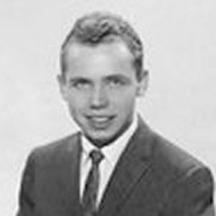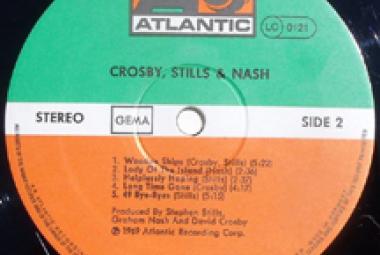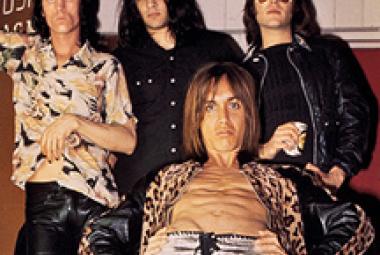DAVID WHITE
David White (born David White Tricker; November 26, 1939, in Philadelphia, Pennsylvania) is an American singer-songwriter. He formed, and was a founding member of the doo-wop quartet Danny & the Juniors as well as being a founding member of the pop trio The Spokesmen. He wrote the Rock and Roll anthem, "Rock and Roll is Here to Stay" and co-wrote a number of other hit songs, including "At the Hop," "You Don't Own Me", and "1-2-3." (More from Wikipedia)
This month’s Under Appreciated Rock Band, CRYSTAL MANSION – often called the Crystal Mansion – is unusual in that several veteran musicians are involved; normally, the UARB’s are bands that are just starting out. Bandmembers include two men who have individual Wikipedia articles (both of which mention Crystal Mansion), David White – who had been a founding member of the estimable 1950’s band Danny and the Juniors – and Sal Rota – a bandmember in the Soul Survivors beginning in 1979. This band is best known for their 1967 hit "Expressway to Your Heart", the first hit song by the Philadelphia soul songwriting and production team of Leon Huff and Kenny Gamble. Both men sang background vocals on Bernadette Peters’ first solo album. There are actually three incarnations of Crystal Mansion, each of which released a self-titled album over a 10-year period.
* * *
David White (real name: David White Tricker) comes from a show biz family, performing as a child with his parents in an acrobatic trio called Barry and Brenda and Company. Singing first tenor, White started a doo-wop vocal group called the Juvenaires in 1955 with Danny Rapp (lead singer), Joe "Terry" Terranova (baritone) and Frank Maffei (second tenor). White made contact with another young singer, John Madara (real name: John Medora) who had a hit in 1957 with "Be My Girl" under the name Johnny Madara. The two wrote a song called "Do the Bop" for the Juvenaires and brought it to their vocal coach and record producer Artie Singer. He liked the song and arranged studio time in Philadelphia to record that song and also a ballad that White had written called "Sometimes (When I'm All Alone)".
At the studio, the Juvenaires were told that they would be singing back-up for John Madara; but as it turned out, his record company turned the song down. Artie Singer took the song to Dick Clark, who suggested that they change the name to "At the Hop", since "bop" was considered old-fashioned by then. (Cyndi Lauper would later revive the term in a completely different context in her 1984 hit song "She Bop").
The band changed its name to Danny and the Juniors and. after performing as a last-minute substitute on American Bandstand, had a #1 hit for 7 weeks with "At the Hop" (beginning in January 1958, and breaking the record among vocal groups). In a classic example of so-called "payola", Artie Singer (who also has a writing credit for "At the Hop") had to sign over one-half of the publishing credits for the song to Dick Clark (Clark sold the rights to the song prior to the Congressional payola hearings in 1960).
The flip side of the hit single "At the Hop" by Danny and the Juniors was the David White song "Sometimes (When I'm All Alone)"; according to Wikipedia (as taken from the article on David White): "’Sometimes (When I'm All Alone)’ became a favorite of a lot of street corner groups just starting out who later became successful, including the Capris, the Chimes, the Cleftones, the Young Rascals, the Del Satins, the Dovells, the Elegants, the Impalas, the Earls, Randy and the Rainbows, the Tokens. the Vogues, and Vito and the Salutations among others."
David White wrote another classic song for Danny and the Juniors called "Rock And Roll Is Here To Stay", the band’s follow-up hit, reaching #19 on the charts. This song has since become a rock and roll standard and was featured in the films Grease and Christine. Danny and the Juniors also released many other songs that are less well known; in all, they have had 9 singles to make the Billboard Hot 100.
* * *
"At the Hop" though has reached almost mythic status, far beyond even the major hit that Danny and the Juniors made of the song. One of the earliest of the rock and roll revival bands, Sha Na Na (with the name taken from among the innumerable nonsense syllables in the classic "Get a Job" by the Silhouettes) performed "At the Hop" at the original 1969 Woodstock festival not long after the group was founded earlier that year. Sha Na Na is perhaps the most unlikely rock band to appear at Woodstock; what’s more, their set immediately preceded that of Jimi Hendrix which included his legendary performance of "The Star Spangled Banner". "At the Hop" also appears in the Woodstock film and the triple-LP Woodstock soundtrack album.
Sha Na Na has had a long career, including a syndicated television show called Sha Na Na from 1977 to 1981 (roughly 10 years after their appearance at Woodstock). Wikipedia lists dozens of albums in the band’s discography. The gonzo antics of the best known member of the band, Jon "Bowzer" Bauman were probably the key to the band's (and the show’s) success. Bowzer did not appear at Woodstock but was in Sha Na Na from 1970 to 1983.
* * *
"At the Hop" was also featured in the nostalgic 1973 hit movie American Graffiti, an early film among the credits for both George Lucas (director) and Francis Ford Coppola (producer). Unlike the other rock and roll hits featured in the film (which were by the original artists and were found only in the soundtrack), three songs were performed in the film by another rock and roll revival band, Flash Cadillac & the Continental Kids. "At the Hop", "Louie Louie" and an original composition by the band called "She's So Fine" were performed "live" by Flash Cadillac & the Continental Kids (under the name of Herbie and the Heartbeats) in the dance party sequence in the film. "Louie Louie" did not appear on the double-LP soundtrack album, 41 Original Hits from the Soundtrack of American Graffiti, though "At the Hop" and "She's So Fine" did.
Flash Cadillac & the Continental Kids (now known as Flash Cadillac) are still around, having released five albums; three singles by the group made the Billboard Hot 100.
* * *
David White left Danny and the Juniors and formed a production and songwriting team with John Madara called Madara and White Productions. One of their early hits was a #7 song that they wrote and produced in 1961 for Chubby Checker called "The Fly".
One of their finest and best known songs is the proto-feminist anthem by Lesley Gore called "You Don't Own Me", a #2 hit in December 1963 that was kept from the top of the charts only by the Beatles’ "I Want to Hold Your Hand". The song was written by David White and John Madara; Quincy Jones was the record producer, and Jones later produced a 2015 remake of "You Don't Own Me" by Australian artist Grace featuring G-Eazy.
David White and John Madara had a second #2 hit song in 1965 with "1-2-3" by Len Barry, who had been the lead singer of the Dovells, one of my favorite early rock and roll groups.
* * *
In 1965, David White and John Madara formed a band called the Spokesmen with a popular Philadelphia disc jockey named Ray Gilmore. They had an "answer song" that year to the Barry McGuire protest song "Eve of Destruction" that was called "The Dawn of Correction" ("You missed all the good in your evaluation . . ."). I used to play those two singles back to back all the time back in the day. White and Madara produced the song, which was written by all three bandmembers. A cover version of the Beatles song "Michelle" by the Spokesmen was a minor hit in the Philadelphia area.
David White, John Madara and Ray Gilmore also co-wrote a song called "Sadie (the Cleaning Lady)" that became a #1 hit in Australia in 1967 for Johnny Farnham.
* * *
In 1963, David White and John Madara were approached by a Cleveland girl group called the Secrets, who had secured a recording contract after playing at a gig with the Starfires (also of Cleveland and later evolving into the Outsiders). They used their influence to release a single in October 1963 on Philips Records, "The Boy Next Door" b/w "Learnin' To Forget" that became a #18 hit. The Secrets released three other unsuccessful singles on Philips Records that each featured a David White/John Madara penned song. The "A" side on one single that is shown in Discogs, "Here He Comes Now!" b/w "Oh Donnie (He Ain't Got No Money)" was co-written by legendary "Philly soul" producer Leon Huff, who also worked with past UARA Mikki.
* * *
The single by the Secrets mentioned above also features the Madara White Orchestra; this name (or variations) shows up on other early 1960’s singles, including the 1963 single "Gotta Dance" b/w "At the Shore" by Johnny Caswell, who later became the lead singer for Crystal Mansion. A version of "La Bamba" was released under the name the Madara White Orchestra, also in 1963. Additionally, David White and John Madara co-wrote both sides of a 1963 single for an active band called the Visions (also known as Bocky and the Visions), "Tommy’s Girl" b/w "Oh Boy, What a Girl".
* * *
Johnny Caswell is mentioned among the greats of Northern Soul, with his song "You Don’t Love Me Anymore" (written by Leon Huff) ranking #152 on the Northern Soul Top 500. His early sides are collected on the above album, The Best of Philly Soul, Vol. 4, with half of the 12 tracks being written or co-written by David White.
* * *
David White and Sal Rota both performed background vocals on Bernadette Peters’ debut album, Bernadette Peters (1980); the front cover was one of the final "Vargas girls" paintings by Alberto Vargas. In 1992, MCA Records released a CD under the name Bernadette combining 8 tracks from this first album plus 5 from her second album Now Playing (1981) that has a different Vargas painting on the cover; the cover on Bernadette is the same Vargas painting from Bernadette Peters.
* * *
The genesis of Crystal Mansion was in an R&B covers band called the Secrets from Mount Laurel, NJ that was active from 1962 to 1968 – they had the same name as the girl group called the Secrets that David White and John Madara had worked with in 1963, though there was apparently no other relation between the two groups. Early bandmembers in the Secrets included guitarist Ronnie Gentile and drummer Rickey Morley; lead vocalist Johnny Caswell and keyboardist Sal Rota were added by 1968. The band came up with a 45 for Capitol Records, "The Thought of Loving You" b/w "Hallelujah"; at that point, the band changed its name to Crystal Mansion. Several Internet sources speak glowingly of Crystal Mansion, particularly with respect to New Jersey music clubs where they often appeared. The success of the single, which reached #1 on the local Los Angeles charts, led to an album for the label in 1969 called Crystal Mansion.
In his Allmusic review of the band’s 1971 album, The Crystal Mansion (though granting that album only two stars), Joe Viglione calls their 1968 single "The Thought of Loving You" "a little mini-pop masterpiece" and "a timeless pop song". This song, "The Thought of Loving You" was released by Cher in 1968 (as a single only) and was later recorded by the Jimmy Castor Bunch, the Manhattan Transfer, Spiral Starecase, Lou Christie, Astrud Gilberto, and Wayne Newton. Unfortunately, the Capitol album sold poorly – Allmusic describes it as "an album that turned out a disappointment for all involved" – and information on the Internet about this album is hard to come by.
Billboard magazine placed the band’s 1969 album Crystal Mansion as the lead-off review in their "Merit Picks" section in the April 19, 1969 edition: "Capable of scoring on both AM and FM, the Crystal Mansion debut with their chart disk, ‘The Thought of Loving You’, and a melodic pop package of David White-Johnny Caswell tunes. Strong, individual vocals highlight ‘For the First Time’, ‘It Takes My Breath Away’ and ‘Somethin’ for You’ as this seven-man pop group bid for dual market honors with the same winning sound that struck pay dirt for groups like the Buckinghams."
(August 2015)















